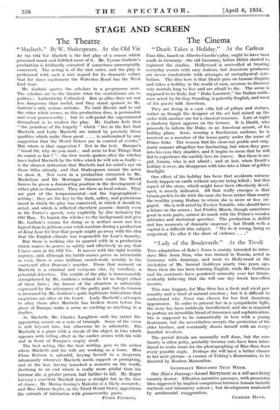STAGE AND SCREEN The Theatre
"Macbeth." By W. Shakespeare. At the Old Vic
AT the Old Vic Macbeth is the last play of a season which promised much and fulfilled most of it.. Mr. Tyrone Guthrie's production is brilliantly executed: if sometimes unacceptably conceived. The acting is of the first order, and the play is performed with such a nice regard for its dramatic values that for sheer excitement the Waterloo Road has the West End beat.
Mr. Guthrie quotes the scholars in a programme note. The scholars are to the theatre what the statisticians are to politics : Authenticity Unlimited. But as allies they are not less dangerous than useful, and they stand sponsor to Mr. Guthrie's only serious mistake. To omit Hecate and to cut the other witch scenes, as this production does, is permissible and even praiseworthy ; but to soft-pedal the supernatural throughout is to weaken the play. Mr. Guthrie feels that " the grandeur of the tragedy " which " lies in the fact that Macbeth and Lady Macbeth are ruined by precisely those qualities which make them great . . . is undermined by any suggestion that the Weird Sisters are in control of events." But where is that suggestion ? Not in the text. Banquo's " Good Sir, why do you start ; and seem to fear Things that do sound so fair ? "—the first words spoken after the witches have hailed Macbeth by the titles which he will win so foully— is the clearest indication that Macbeth had his mind's eye on those titles already, and that Shakespeare meant the actor to show it. Not even in a production entrusted to Mr. Maskelync and Dr. Montague Summers could the Weird Sisters be given a dominating position in the development of either plot or character. They are there as local colour. They are part of the temperamental—not the topographical— setting ; they arc the key to the dark, sultry, and portentous mood in which the play was conceived, in which it should be acted, and which is reflected elsewhere passim—faintly even in the Porter's speech, very explicitly by (for instance) the Old Man. To banish the witches to the background and give Mr. Guthrie's excuse for doing so is neither more nor less logical than to jettison your wind-machine during a production of King Lear for fear that people might go away with the idea that the English climate was responsible for Lear's insanity. But there is nothing else to quarrel with in a production which makes its points as subtly and effectively as any that I have seen at the Old Vie. It moves with the right terrible urgency, and, although the battle-scenes prove as intractable as ever, there is some brilliant crowd-work, notably in the courtyard after Duncan's murder. From that moment on Macbeth is a criminal and everyone else, by corollary, a potential detective. The middle of the play is immeasurably strengthened by Mr. Guthrie's refusal to let us forget either of these facts ; the horror of the situation is sufficiently expressed by the utterances of the guilty pair, but its tension is increased by Mr. Guthrie's quite legitimate indications that suspicions are alive at the Court. Lady Macbeth's attempts to allay them after Macbeth has broken down before the ghost of Banquo make a scene as exciting as anything in a thriller.
As Macbeth, Mr. Charles Laughton ends his rather dis- appointing season on a note of triumph. Some of the verse is still beyond him, but otherwise he is admirable. His Macbeth is a giant with a streak of the abject in him which appears with telling effect in the earlier scenes with his wife and in front of Banquo's empty stool. The best acting, like the best writing, goes to the scenes where Macbeth and his wife are working as a team. Miss Flora Robson is splendid, keying herself to a desperate inhumanity whenever Macbeth needs support or prompting, and at the last, having launched a monster on the world,
declining to an end which is really more pitiful than his
because she, a greater person, had further to fall. Mr. Roger Livesey's excellent Macduff keeps a straight bat in the face of chaos ; Mr. Marius Goring's Malcolm is a likely monarch ; and Miss Athenc Seyler, as the Third Weird Sister, apportions the entrails of batriachia with praiseworthy gusto.
PETER FLEMING/.








































 Previous page
Previous page